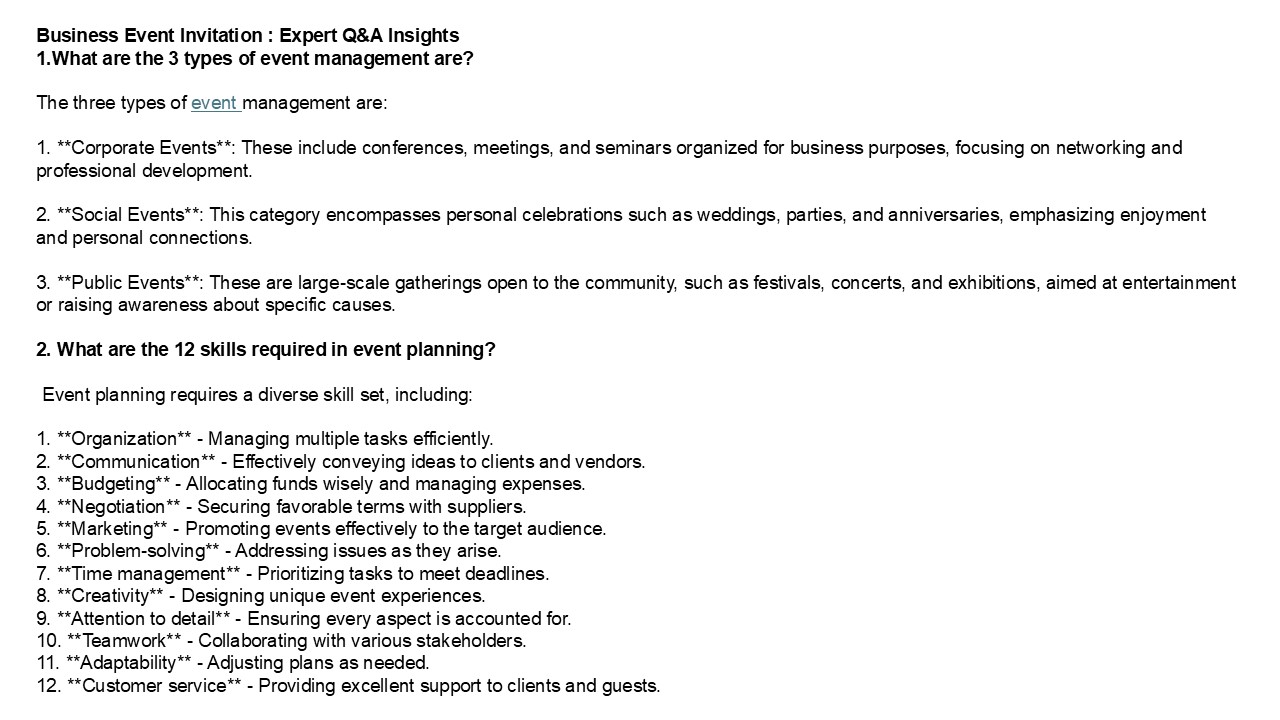The Eight Key Elements of Successful Event Planning - PowerPoint PPT Presentation
Title:
The Eight Key Elements of Successful Event Planning
Description:
Event management involves planning three main types of events: corporate, social, and public. Each type requires a tailored approach based on its audience and purpose. Successful event planning relies on twelve key skills, including organization, communication, and problem-solving, which help planners handle the challenges of each event. There are eight important elements to consider: choosing a venue, budgeting, logistics, promotion, programming, attendee experience, risk management, and post-event evaluation. The planning process consists of four stages: conception, planning, execution, and evaluation. However, event management can be stressful due to factors like tight deadlines, demanding clients, and unexpected issues, increasing pressure on planners. Overall, effective event management requires careful coordination and adaptability to ensure successful outcomes. – PowerPoint PPT presentation
Number of Views:0
Date added: 4 December 2024
Slides: 4
Provided by:
visualsculptors
Category:
How To, Education & Training
Tags:
Title: The Eight Key Elements of Successful Event Planning
1
Business Event Invitation Expert QA
Insights 1.What are the 3 types of event
management are? The three types of event
management are 1. Corporate Events These
include conferences, meetings, and seminars
organized for business purposes, focusing on
networking and professional development. 2.
Social Events This category encompasses
personal celebrations such as weddings, parties,
and anniversaries, emphasizing enjoyment and
personal connections. 3. Public Events
These are large-scale gatherings open to the
community, such as festivals, concerts, and
exhibitions, aimed at entertainment or raising
awareness about specific causes. 2. What are
the 12 skills required in event planning?
Event planning requires a diverse skill set,
including 1. Organization - Managing
multiple tasks efficiently. 2. Communication
- Effectively conveying ideas to clients and
vendors. 3. Budgeting - Allocating funds
wisely and managing expenses. 4. Negotiation
- Securing favorable terms with suppliers. 5.
Marketing - Promoting events effectively to
the target audience. 6. Problem-solving -
Addressing issues as they arise. 7. Time
management - Prioritizing tasks to meet
deadlines. 8. Creativity - Designing unique
event experiences. 9. Attention to detail -
Ensuring every aspect is accounted for. 10.
Teamwork - Collaborating with various
stakeholders. 11. Adaptability - Adjusting
plans as needed. 12. Customer service -
Providing excellent support to clients and guests.
2
3. What are the 8 elements of effective event
planning? The eight elements of effective
event planning are 1. Purpose Clearly
define the event's goals and objectives. 2.
Budget Establish a realistic budget covering
all expenses. 3. Venue Choose an appropriate
location that fits the event's theme and size. 4.
Audience Identify and understand the target
audience. 5. Timeline Create a detailed
timeline for planning and execution. 6.
Marketing Develop a marketing strategy to
promote the event. 7. Logistics Plan for
transportation, catering, equipment, and
staff. 8. Evaluation Establish metrics for
assessing the events success post-execution. 4.
What are the four stages of event planning? The
four stages of event planning are 1.
Pre-Planning Define the event's purpose, set
goals, and establish a budget. 2. Planning
Organize logistics, select venues, create a
timeline, and coordinate vendors. 3.
Execution Implement the plan on the event
day, manage activities, and ensure everything
runs smoothly. 4. Post-Event Evaluate the
event's success, gather feedback, address any
issues, and follow up with participants and
stakeholders. 5. What makes an event stressful?
An event becomes stressful due to factors such
as high stakes, time pressure, uncertainty, and
lack of control. Emotional triggers, like fear of
failure or judgment, can amplify stress.
Additionally, inadequate preparation or support
can heighten anxiety. Personal significance,
expectations, and previous experiences also play
a role. Environments that are chaotic or
unfamiliar can increase feelings of overwhelm.
Ultimately, the perception of the event and one's
ability to cope with challenges largely determine
the stress level experienced.
3
Visit VS Website See more Blog































